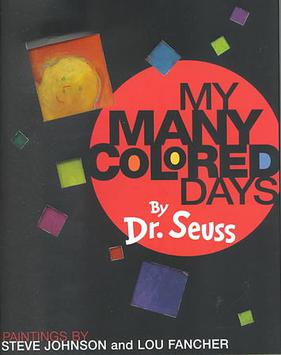My Many Colored Days facts for kids
 |
|
| Author | Dr. Seuss |
|---|---|
| Illustrator | Steve Johnson Lou Fancher |
| Country | USA |
| Language | English |
| Genre | Children's literature |
| Publisher | Alfred A. Knopf |
|
Publication date
|
March 1, 1996 |
| Media type | Print (Hardcover, board book) |
| Pages | 32 |
| ISBN | 0-679-87597-2 |
| OCLC | 164575524 |
| [E] 20 | |
| LC Class | PZ8.3.G276 My 1996 |
| Preceded by | The Secret Art of Dr. Seuss |
| Followed by | Hooray for Diffendoofer Day! |
My Many Colored Days is a special children's book written by Theodor Geisel, who is much better known as Dr. Seuss. This book helps young readers understand their feelings by connecting them to different colors. It was published in 1996, after Dr. Seuss had passed away.
Contents
About My Many Colored Days
This unique book explores how our feelings can change, just like colors. It uses simple rhymes to describe different emotions. Each emotion is linked to a specific color, helping kids imagine how their feelings might look. For example, a happy day might be bright yellow, while a sad day could be blue.
The Story Behind the Book
Dr. Seuss wrote the ideas for My Many Colored Days way back in 1974. He wanted to create a book that would be filled with amazing, colorful pictures. He hoped to find a "great color artist" who could bring his ideas to life. He believed this book would be one of the first to truly focus on beautiful illustrations and fantastic colors to show feelings.
Bringing the Book to Life
After Dr. Seuss died in 1991, his ideas for this book were found. The publishing company, Alfred A. Knopf, decided to publish it in 1996. Artists Steve Johnson and Lou Fancher created the wonderful paintings that you see in the book. Their artwork perfectly matches Dr. Seuss's vision of a book bursting with color and emotion.
Why This Book is Important
My Many Colored Days is more than just a story. It helps kids learn about their own emotions and how to talk about them. It shows that it's normal to have many different feelings, and each one is okay. The National Education Association even listed it as one of the "Teachers' Top 100 Books for Children" in 2007. This shows how much teachers value its message and its creative way of teaching about feelings.
 | Sharif Bey |
 | Hale Woodruff |
 | Richmond Barthé |
 | Purvis Young |

